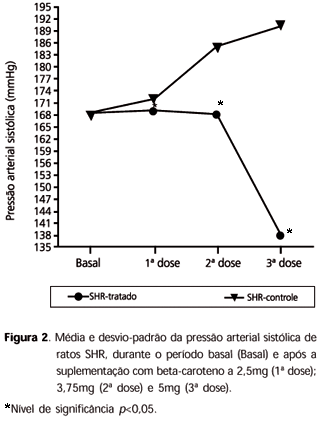OBJECTIVE: To investigate if supplementation with supraphysiological doses of beta-carotene has a positive effect on controlling hypertension and detect possible adverse effects of this supplementation. METHODS: 20-week-old spontaneously hypertensive rats (n=12) and normotensive rats (n=12) were submitted to a basal period of 10 days, then divided into 4 groups of 6 animals and supplemented daily by orogastric gavage with beta-carotene in 3 different doses: 2.5mg, 3.75mg and 5.0mg/animal during 14 days for each dose that was inserted by a seven day wash-out period; control groups received only coconut oil. Animals were submitted to ectoscopic evaluation to detect possible toxic effects or interaction between nutrients and analysis of biological parameters; systolic blood pressure was measured by plethysmography twice a week on alternate days; after the supplementation period, animals were killed and their livers weighed by the Scherle method. RESULTS: Administration of beta-carotene did not alter the animals' biological parameters or cause any toxic effects. Regarding systolic blood pressure, both lineages showed significant results (p<0.05), with the highest dose presenting the best results. The average liver weight was 7.25 (3.2 standard-deviation) grams, and the relationship between the average liver weight and body weight was 0.0192 for the hypertensive group. CONCLUSION: Beta-carotene supplementation was effective in controlling and preventing hypertension in rats. The relationship between liver weight and body weight was normal.
beta-carotene; hypertension; malondialdehyde




